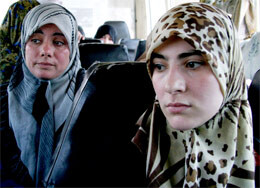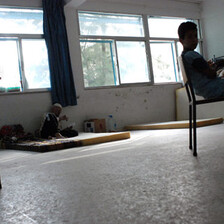Electronic Lebanon 20 June 2007

Over 25,000 Palestinian civilians fled Nahr al-Bared on buses and by foot since the outbreak of fighting between the Lebanese army and Islamist militants on May 20. (Hugh Macleod/IRIN)
But one 16-year-old Palestinian student told IRIN his worst ordeal began after he escaped the camp.
About 10 men he identified as soldiers and police were standing at a junction leading to the village of Muhammara, above Nahr al-Bared. “They asked to see my identity card,” said the boy, who requested anonymity for fear of retribution. “As soon as they saw it was blue (for Palestinian), they said ‘Take him.’”
“They tied me up with plastic ties, pushed me to the floor and beat me with rifle butts.” The beating occurred there and then, he said, then they took him to a nearby military headquarters where the treatment continued.
He held out his wrists, where scars are visible, and showed a long gash below his neck. He lost part of his ear and the blows bruised him all over.
The boy, sitting with his uncle in a dark room in the nearby Baddawi camp with bandages over his wounded ear and above his eye, said the beating started before any questions were asked. At the headquarters, his interrogators accused him of lying “like all Palestinians.” “One took out a pistol and said ‘you’re Fatah al-Islam, we’re going to shoot you.’ I said: ‘I’m not Fatah al-Islam, I’m not anything.’”
So beaten and bloodied was his appearance, he said, that men who appeared to be Lebanese plainclothes army intelligence officers made the soldiers sign a form confirming that they had delivered him in that state before accepting him for interrogation. He was released about seven hours after he was apprehended.
Alleged abuse
It is an extreme, but not isolated tale. Caoimhe Butterly, a prominent social and human rights activist temporarily based at the camp, said the local rights groups and journalists had between them documented dozens of cases of alleged abuse of Palestinians fleeing the conflict between the army and Islamist militants sheltering in the camp.
Old hostilities, failure to differentiate between the militants and Palestinian civilians and mass support for the army risk combining to create an atmosphere of impunity in Lebanon, activists said.
Accounts range from slapping, shoving and insults to harsh beatings and death threats, all of which are denied by the army.
“It would be unfair to say all Palestinians who leave the camp are being beaten up, but there are enough cases to cause us to be very alarmed,” said Nadim Houry of Human Rights Watch, as he gathered testimony in Baddawi camp.
Houry said he had met the army and conveyed Human Rights Watch’s concerns. The group has asked the army to investigate the claims.
The army’s battle with Fatah al-Islam began four weeks ago, with a police raid to arrest alleged members in connection with a bank robbery. In response, Fatah al-Islam gunmen overran the army base near Nahr al-Bared camp, where the group has been based since November, and killed 33 soldiers, many in their sleep.
The ferocity of the attack, the worst day for the army since the civil war, shocked Lebanese, who have rallied behind the institution seen by many as the only one left in the sectarian country that is capable of uniting society.
General denies allegations
Gen Michel Suleiman, commander of the Lebanese army, told IRIN in an interview that all allegations of mistreatment of Palestinians were unfounded. “I deny completely and categorically the lies that were issued about the practices of the Lebanese army,” he said, when asked about the alleged abuse.
“The army is the most important institution in Lebanon and it is under attack. It has never been recorded in its history, not once, that it breached human rights.”
In a statement issued last week, Human Rights Watch made clear that interrogating witnesses leaving Nahr El-Bared was the army’s right, so long as Lebanese laws banning torture and the Geneva Conventions were upheld.
“But the army must issue strict instructions and must be seen to take measures to discipline those who are doing this. There must be an investigation to figure out exactly what happened,” Houry said. Suleiman said guidelines were issued at the start of the conflict calling on soldiers to treat those leaving the camp with respect.
Fraught relationship
Relations between the roughly 400,000 refugees, about half of whom live in 12 camps, and their hosts are often fraught, with some Lebanese blaming the Palestinians for the outbreak of the country’s 1975-1990 civil war. Palestinians in Lebanon are denied from working in more than 70 professions and from property ownership, among other civil rights.
“There must not be an air of impunity because the Palestinians are weak and people can get away with it,” said Houry.
“There is definitely a criminalisation of civilians happening, a homogenisation of Palestinian civilians with Fatah al-Islam, particularly those who chose to stay behind in the camp,” Butterly said.
“People are being subjected to mild to severe physical abuse, and I think it’s widespread and systematic from the testimony we’re gathering,” she said. Most testimony alleged abuse by soldiers, “but local militias have joined in, in at least one case,” she added.
Many Palestinians, particularly young males, have been held for several hours and slapped and taunted, she said. More severe alleged abuse involved Palestinians being threatened with death, handcuffed in painful “stress positions” for hours and beaten. Some witnesses said medication, food and water were withheld altogether or inadequate.
Fear
Human Rights Watch said such accounts were deterring some of the estimated 5,000 Palestinians still inside Nahr al-Bared camp from leaving. Rania Masri, a civil rights activist with the Nahr al-Bared Relief Campaign, said fear of mistreatment is discouraging Palestinians from moving around in general.
“We personally know that many are not going to work outside Badawi camp, for example because they’re afraid of being subject to ill-treatment,” she said.
Suleiman expressed surprise about the human rights group’s concerns about the Palestinians’ accounts. “Allegations of torture are not true or realistic because the army is not their enemy. On the contrary, it has strived to protect them despite losing 74 martyrs from its ranks.” Elements that had shot at the army from within the camp had “disguised themselves among the innocent,” he said.
One 18-year-old youth told IRIN he had been beaten and kicked repeatedly during 13 hours in custody with scores of other Palestinian youths, boys and men.
“I’d stayed behind in a shelter in Nahr al-Bared after my family left, but then the shelling got really bad so I had to go,” said the youth, who worked in a mini-market before the crisis started. At a checkpoint near the southern exit, he was seized and taken into custody.
“Several commandos hit me during the investigation, and I saw others get much worse than I got,” he said. “The worst thing was that they insulted Palestine, my people and my mother and sister. No one can tolerate that.”
This item comes to you via IRIN, a UN humanitarian news and information service, but may not necessarily reflect the views of the United Nations or its agencies. All IRIN material may be reposted or reprinted free-of-charge; refer to the copyright page for conditions of use. IRIN is a project of the UN Office for the Coordination of Humanitarian Affairs.
Related Links


